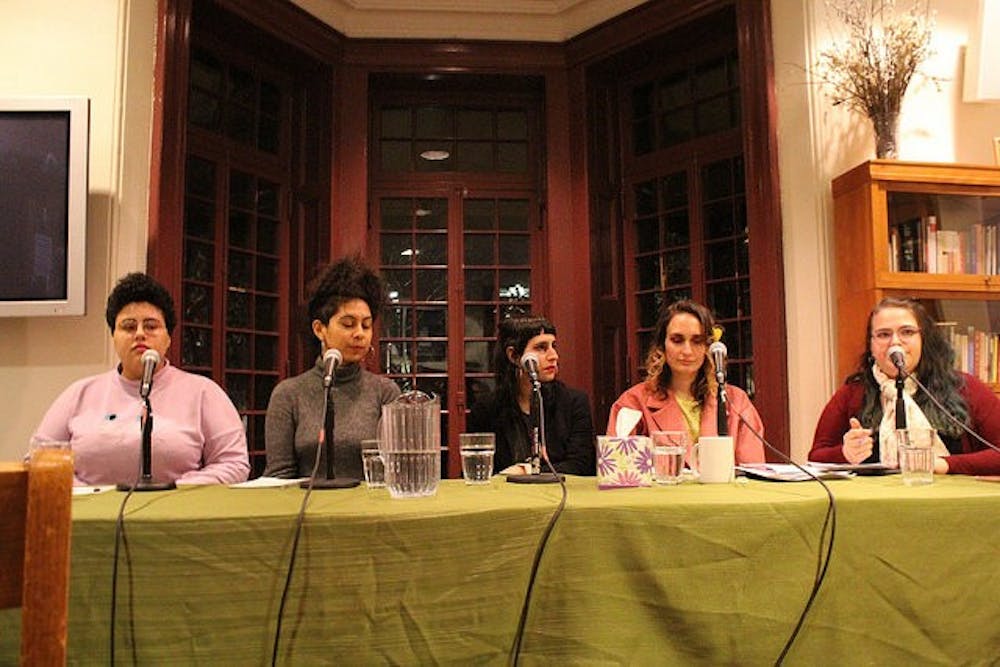It’s January 31 and the room is packed. To be quite frank, I didn’t quite expect the room to be as full as it was. Still, I walk in and settle into a chair at the very exterior perimeter of the room (on account of my own time management, so the fault was all mine). Ahead of me are rows and rows of people, an audience with a diversity almost impossible to find elsewhere on campus. I am at the Kelly Writers House. For those unfamiliar, it’s the quaint beige and green building obscured by either by the greenness of surrounding trees or the flurry of snow that blankets the branches, nestled comfortably between Perry World House and Sigma Chi.
The event I’m at is called Shifting the Gaze, an event series created to “explore the intersectional challenges that women and other marginalized people face in the music industry.” The series was initiated by Amanda Silberling (C ’18) in 2015 to bring together a panel of speakers to talk about the issues of gender equality and injustice in the music industry. Now in 2018, the topic seems almost all too relevant in light of the #MeToo and Time’s Up movements, among others.
Today, the panel consists of four women in addition to Amanda. There’s Jazz Adam—a founding member of All Mutable, a booking collective that focuses on curating lineups that represent people of color, women, and LGBTQ+ communities, and the guitarist and vocalist of Old Maybe, a three–piece no–wave band. There’s Andrea Jácome, who pleasantly tells the audience we can call her Dré. She’s the cultural organizer and facilitator in Philadelphia and NYC and the former community organizing director at Girls Rock Philly, an organization described as “a music mentorship nonprofit that builds with girls, women, trans, and gender non–conforming people.” There’s Marisa Dabice, a performance artist based in Philadelphia working on a new Mannequin Pussy record—a face we might see on city council after the 2024 elections. And of course, there’s Sadie Dupuis, the guitarist, vocalist, and songwriter for the band Speedy Ortiz.
Going into the event, I’m expecting a panel to talk about the repression of women. A few personal stories. Some statistics thrown out, maybe. But the panel is anything but that. (Okay, there were a few personal stories.) These women on the panel are people who haven’t just experienced firsthand the daily sexism of the music industry. They’re people who reacted to make the music industry a better and safer place.
Each one of these women have responded in their own ways to change the inherent sexism of the industry. Marissa talks to fans about the venues to gain a better understanding of the audience. If a venue draws young, prepubescent teenagers with fragile masculinities, it’s crossed off the list. Dupuis has a help hotline at her concerts so that fans can discreetly text any problems at the venue and describe the suspect perpetrators. The text is then forwarded to the entire crew, allowing them to react accordingly without any public disturbance. Jazz, as the booker of venues, makes sure every place is a safe space before booking it. With everything going on in Hollywood and the Capitol right now, she says, “people are innocent until they’re found out.” Better to prevent any act at all than to bring a case to court when someone has already been hurt. Dré builds up relationships between girls, women, trans, and gender non—conforming people to strengthen the community and support. These may seem like simple acts, but, at least in my opinion, they go so much farther than merely sporting white roses at the Grammys.
By the end of the panel, I’m not surprised anymore by the sheer number of people in attendance. The room is packed, but it’s packed for good reason.

